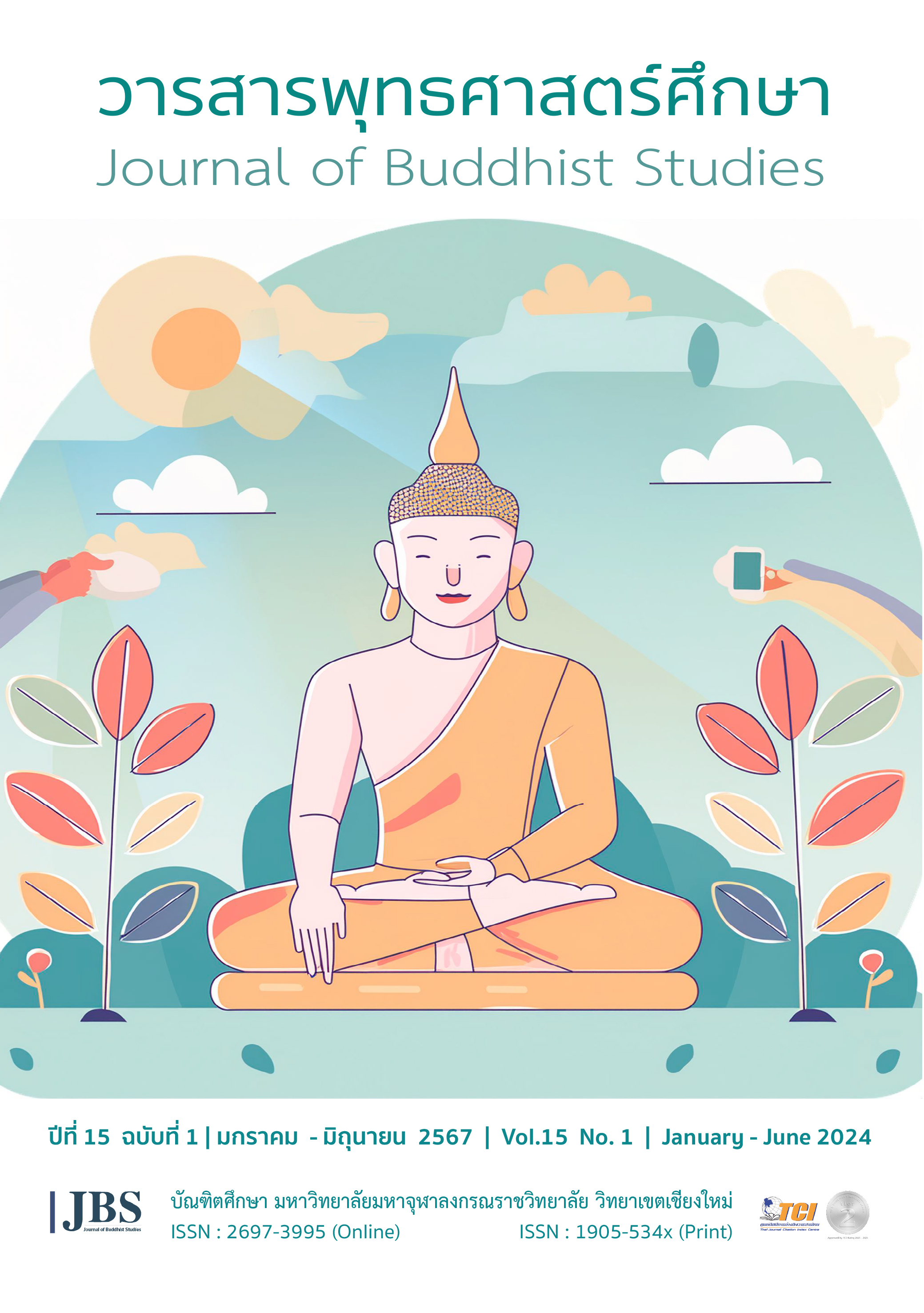การพัฒนาหลักสูตรส่งเสริมความสามารถในการแก้ปัญหาทางคณิตศาสตร์ โดยใช้รูปแบบเอส เอส ซี เอสร่วมกับการจัดการเรียนรู้ห้าแนวปฏิบัติการสอน สำหรับนักเรียนชั้นมัธยมศึกษาปีที่ 4
คำสำคัญ:
Curriculum development, Mathematical problem solving ability, SSCS method, Five practicesบทคัดย่อ
บทความวิจัยนี้มีวัตถุประสงค์เพื่อ 1) สร้างและหาดัชนีประสิทธิผลของหลักสูตรส่งเสริมความสามารถในการแก้ปัญหาทางคณิตศาสตร์โดยใช้รูปแบบเอส เอส ซี เอสร่วมกับการจัดการเรียนรู้ห้าแนวปฏิบัติการสอน สำหรับนักเรียนชั้นมัธยมศึกษาปีที่ 4 2) ศึกษาความสามารถในการแก้ปัญหาทางคณิตศาสตร์โดยใช้รูปแบบเอส เอส ซี เอสร่วมกับการจัดการเรียนรู้ห้าแนวปฏิบัติการสอน สำหรับนักเรียนชั้นมัธยมศึกษาปีที่ 4 ซึ่งเป็นการวิจัยเชิงทดลองเบื้องต้น แบบแผนที่ใช้ในการทดลองครั้งนี้ คือแบบกลุ่มเดียวทดสอบก่อน - หลังการทดลอง กลุ่มตัวอย่าง ได้แก่ นักเรียนชั้นมัธยมศึกษาปีที่ 4/2 ภาคเรียนที่ 2 ปีการศึกษา 2565 โรงเรียนเถินวิทยา จังหวัดลำปาง สำนักงานเขตพื้นที่การศึกษามัธยมศึกษาลำปาง ลำพูน จำนวน 34 คน มาจากการสุ่มแบบกลุ่ม โดยทำการสุ่มโรงเรียนจากโรงเรียนในสหวิทยาเขตเถินบุรินทร์มา 1 โรงเรียน ได้โรงเรียนเถินวิทยา ซึ่งมี 2 ห้องเรียน คือชั้นมัธยมศึกษาปีที่ 4/2 และ 4/3 ทำการสุ่มกลุ่มตัวอย่างได้นักเรียนชั้นมัธยมศึกษาปีที่ 4/2 เครื่องมือที่ใช้ในการวิจัย ได้แก่ หลักสูตร คู่มือการใช้หลักสูตร แบบทดสอบวัดความสามารถในการแก้ปัญหาทางคณิตศาสตร์ สถิติที่ใช้ในการวิเคราะห์ข้อมูล ได้แก่ ค่าเฉลี่ย ร้อยละ ส่วนเบี่ยงเบนมาตรฐาน และการทดสอบค่าที
ผลการวิจัยพบว่า 1) หลักสูตรส่งเสริมความสามารถในการแก้ปัญหาทางคณิตศาสตร์โดยใช้รูปแบบเอส เอส ซี เอสร่วมกับการจัดการเรียนรู้ห้าแนวปฏิบัติการสอน สำหรับนักเรียนชั้นมัธยมศึกษาปีที่ 4 มี 7 องค์ประกอบ ได้แก่ (1) ความเป็นมาและความสำคัญของหลักสูตร (2) หลักการของหลักสูตร (3) จุดมุ่งหมายของหลักสูตร (4) เนื้อหาหลักสูตร โดยประกอบด้วย 2 หน่วยการเรียนรู้ ได้แก่ หน่วยที่ 1 สถานการณ์ปัญหาเกี่ยวกับ ความยาว พื้นที่ และปริมาตร และหน่วยที่ 2 สถานการณ์ปัญหาเกี่ยวกับเงินและร้อยละ (5) การจัดกิจกรรมการเรียนการสอน (6) สื่อและแหล่งเรียนรู้ (7) การวัดและประเมินผล ค่าเฉลี่ยความเหมาะสมของหลักสูตรในภาพรวมอยู่ในระดับมากที่สุด ค่าเฉลี่ยความเหมาะสมของคู่มือการใช้หลักสูตรในภาพรวมมีความเหมาะสมอยู่ในระดับมากที่สุด และหลักสูตรมีค่าดัชนีประสิทธิผลอยู่ที่ 0.6202 2) นักเรียนที่เรียนโดยใช้หลักสูตรส่งเสริมความสามารถในการแก้ปัญหาทางคณิตศาสตร์โดยใช้รูปแบบเอส เอส ซี เอสร่วมกับการจัดการเรียนรู้ห้าแนวปฏิบัติการสอน สำหรับนักเรียนชั้นมัธยมศึกษาปีที่ 4 มีความสามารถในการแก้ปัญหาทางคณิตศาสตร์หลังเรียนสูงกว่าก่อนเรียน อย่างมีนัยสำคัญทางสถิติที่ .05
เอกสารอ้างอิง
กระทรวงศึกษาธิการ. (2560). ตัวชี้วัดและหลักสูตรแกนกลาง กลุ่มสาระการเรียนรู้วิทยาศาสตร์ฉบับปรับปรุง พ.ศ. 2560 ตามหลักสูตรแกนกลางการศึกษาขั้นพื้นฐาน พุทธศักราช 2551.
สํานักคณะกรรมการศึกษาขั้นพื้นฐานกระทรวงศึกษาธิการ, กรุงเทพมหานคร: โรงพิมพ์ชุมนุม สหกรณ์การเกษตรแห่งประเทศไทยจํากัด.
จันทรรัตน์ จาดแหและปริญญภาษ สีทอง. (2565). การพัฒนาหลักสูตรส่งเสริมความสามารถในการอ่านจับใจความสำคัญ โดยใช้กลวิธีการสอนแบบดี อาร์ ที เอ สำหรับนักเรียนชั้นประถมศึกษาปีที่ 3. วิทยานิพนธ์ครุศาสตรมหาบัณฑิต สาขาวิชาหลักสูตรและการสอน มหาวิทยาลัยราชภัฏลำปาง.
ใจทิพย์ เชื้อรัตนพงษ์. (2557). การพัฒนาหลักสูตรหลักการและแนวปฏิบัติ. กรุงเทพมหานคร: โรงพิมพ์อลีนเพรส.
ชวลิต ชูกําแพง. (2551). การพัฒนาหลักสูตร. มหาสารคาม: ทีคิวพี จํากัด.
ชาญณรงค์ วิเศษสัตย์. (2563). แนวทางการจัดการเรียนรู้เพื่อส่งเสริมความเข้าใจทางคณิตศาสตร์ Learning Management Guideline to Enhance Mathematical Understanding. วารสารคณิตศาสตร์ Mathematical Journal. 15(1) , 106-116.
ธัญญพร ไชวงศ์. (2560). การส่งเสริมความสามารถในการแก้ปัญหาทางคณิตศาสตร์ของนักเรียนชั้นมัธยมศึกษาปีที่ 2 โดยใช้ 5 แนวปฏิบัติการสอน. วิทยานิพนธ์ปริญญามหาบัณฑิต. บัณฑิตวิทยาลัย: มหาวิทยาลัยเชียงใหม่.
นันทพร รอดผล. (2557). การพัฒนาผลการเรียนรู้และความคิดสร้างสรรค์ เรื่อง สิ่งแวดล้อมและการพัฒนา ด้วยการจัดการเรียนรู้แบบ SSCS ของนักเรียนชั้นมัธยมศึกษาปีที่ 4. วิทยานิพนธ์ศึกษาศาสตรมหาบัณฑิต. บัณฑิตวิทยาลัย: มหาวิทยาลัยศิลปากร.
ประสาท เนื่องเฉลิม. (2553) .หลักสูตรการศึกษา. มหาสารคาม : สำนักพิมพ์มหาวิทยาลัยมหาสารคาม.
เปรมกมล อินหลี. (2560). การวิจัยในชั้นเรียนเพื่อส่งเสริมความสามารถในการแก้ปัญหาทางคณิตศาสตร์ของนักเรียนชั้นมัธยมศึกษาปีที่ 4 ผ่านการใช้ 5 แนวปฏิบัติการสอน. วิทยานิพนธ์ศึกษาศาสตรมหาบัณฑิต. บัณฑิตวิทยาลัย: มหาวิทยาลัยเชียงใหม่.
มณีรัตน์ พันธุตา. (2556). การศึกษาความสามารถในการแก้ปัญหาคณิตศาสตร์และผลสัมฤทธิ์ทางการเรียน ของนักเรียนชั้นมัธยมศึกษาปีที่ 4 โดยใช้รูปแบบ SSCS ร่วมกับกระบวนการแก้ปัญหาของ POLYA. วารสารศึกษาศาสตร์ มหาวิทยาลัยขอนแก่น. 8 (1) : 102-115.
มนสิช สิทธิสมบูรณ์. (2563). การพัฒนาหลักสูตรเสริมสร้างสมรรถนะการวิจัยในชั้นเรียนด้วยการวิจัย ปฏิบัติการแบบมีส่วนร่วมสำหรับครูระดับการศึกษาขั้นพื้นฐาน. วารสารศึกษาศาสตร์ มหาวิทยาลัยนเรศวร. 5(5), 186-199.
เมธาสิทธิ์ ธัญรัตนศรีสกุล. (2557). ผลการจัดการเรียนรู้ด้วยรูปแบบ SSCSE ที่มีต่อการแก้ปัญหา และ ผลสัมฤทธิ์ทางการเรียนวิชาคณิตศาสตร์ เรื่อง สถิติ สำหรับนักเรียนชั้นมัธยมศึกษา ปีที่ 6. วิทยานิพนธ์ศึกษาศาสตรมหาบัณฑิต. บัณฑิตวิทยาลัย: มหาวิทยาลัยศิลปากร.
วิชัย วงษ์ใหญ่. (2552). หลักสูตรสารานุกรมวิชาชีพครูเฉลิมพระเกียรติพระบาทสมเด็จพระเจ้าอยู่หัวเนื่องในโอกาสมหามงคลเฉลิมพระชนมพรรษา 80 พรรษา. กรุงเทพมหานคร: สำนักงานเลขาธิการคุรุสภา.
สุวิธิดา จรุงเกียรติกุล. (2557). การศึกษาและการเรียนรู้ตลอดชีวิต = Lifelong education and lifelong learning. (พิมพ์ครั้งที่ 2). กรุงเทพมหานคร: ศูนย์ตำราและเอกสารทางวิชาการ คณะครุศาสตร์ จุฬาลกรณ์มหาวิทยาลัย.
สถาพร พฤฑฒิกุล. (2558). คุณภาพผู้เรียน เกิดจากกระบวนการเรียนรู้. สระแก้ว: คณะเทคโนโลยีการเกษตร มหาวิทยาลัยบูรพา วิทยาเขตสระแก้ว.
อนงค์ วิชาลัย และวชิรา เครือคำอ้าย. (2556). การศึกษาผลสัมฤทธิ์ทางการเรียนชั้นประถมศึกษาปีที่ 2โดยใช้กิจกรรมเรียนรู้ตามทฤษฏีการสร้างความรู้ด้วยตนเอง กลุ่มสาระการเรียนรู้สังคมศึกษา ศาสนาและวัฒนธรรม โรงเรียนบวกครกเหนือ จังหวัดเชียงใหม่. วิทยานิพนธ์. ครุศาสตรมหาบัณฑิต สาขาสังคมศึกษา มหาวิทยาลัยราชภัฏเชียงใหม่.
อนงค์ เมธีพิทักษ์ธรรม. (2555). ผลของการให้ข้อมูย้อนกลับที่แตกต่างกันที่มีผลต่อความสามารถในการแก้ปัญหาทางคณิตศาสตร์ของผู้เรียนชั้นมัธยมศึกษา ปีที่ 1. วิทยานิพนธ์ครุศาตรมหาบัณฑิต. บัณฑิตวิทยาลัย: จุฬาลงกรณ์มหาวิทยาลัย.
อภิชญาดา บุญวิรัตน์และปริญญภาษ สีทอง. (2554). การพัฒนาหลักสูตรเสริมทักษะการแก้โจทย์ปัญหาทางคณิตศาสตร์โดยใช้แนวคิดกระบวนการแก้ปัญหาแดปิค สำหรับนักเรียนชั้นประถมศึกษา ปีที่ 6. วิทยานิพนธ์ครุศาสตรมหาบัณฑิต. บัณฑิตวิทยาลัย: มหาวิทยาลัยราชภัฏลำปาง.
Krulik and Rudnick. (1987, November). “Problem Solving and Stragetegy Games,” in The Mathematic Teacher. New York : McGraw – Hill.
Pizzini, Edward L.; &Shepardson; Abell, Sandra K. (1989). A Rationale for and the Development of a Problem Solving Model of Instruction in Science. Education : Science Education
Smith, M., & Stein, M. (2011). 5 practices for orchestrating productive mathematics discussions. Reston. VA: National Council of Teachers of Mathematics.
Taba, H. (1962). Curriculum Development Theory and Practice. New York : Harcourt, Brace and World
ดาวน์โหลด
เผยแพร่แล้ว
รูปแบบการอ้างอิง
ฉบับ
ประเภทบทความ
สัญญาอนุญาต
ลิขสิทธิ์ (c) 2024 วารสารพุทธศาสตร์ศึกษา

อนุญาตภายใต้เงื่อนไข Creative Commons Attribution-NonCommercial-NoDerivatives 4.0 International License.






